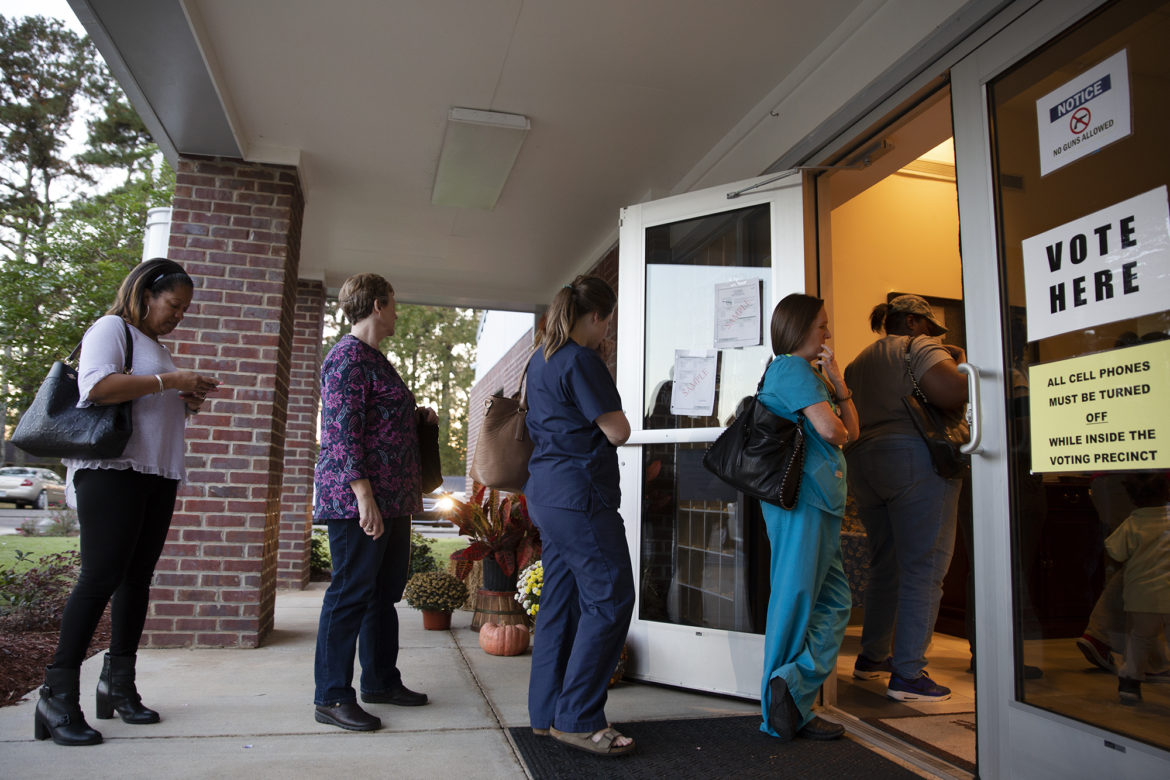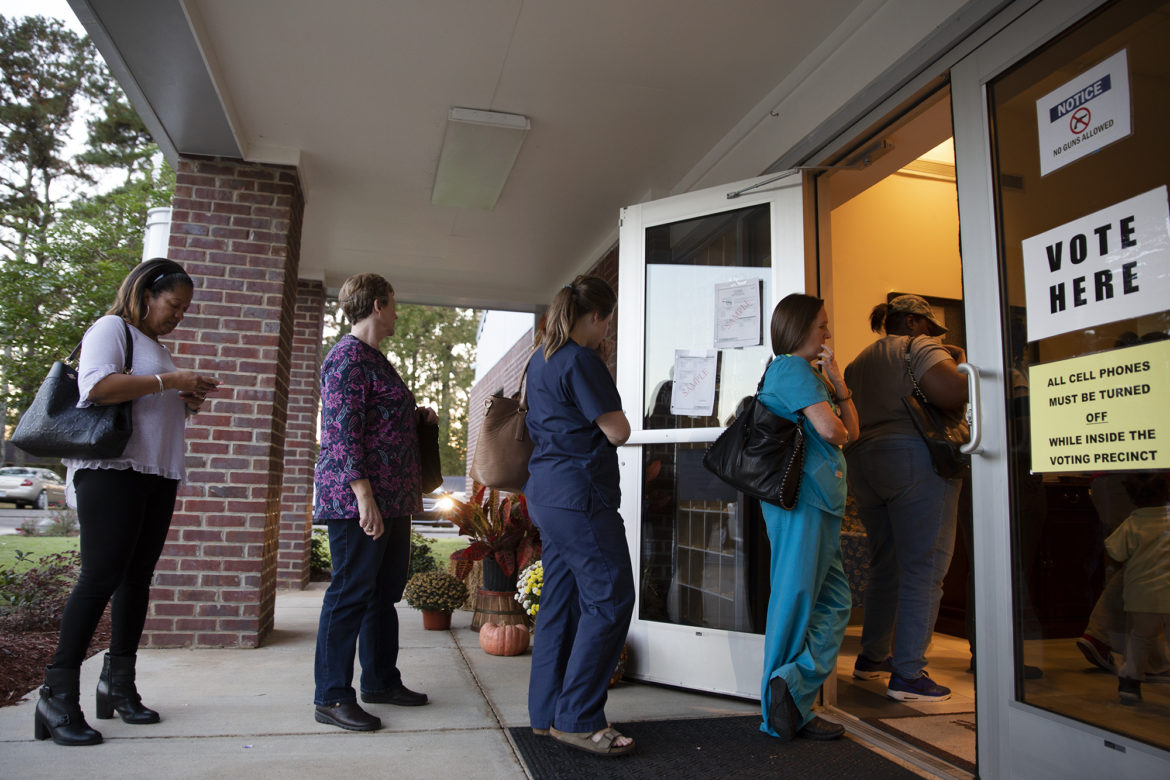Mississippi Today
Lawmakers pass ‘voter purge’ bill that could keep some Mississippians from voting


Lawmakers pass ‘voter purge’ bill that could keep some Mississippians from voting
The Republican leadership of the Mississippi Legislature has for years attempted to make it easier to remove voters from the election rolls.
They finally succeeded with legislation that passed both chambers on Tuesday and now needs the signature of Gov. Tate Reeves to become law. The governor is expected to sign the bill, which authorizes Secretary of State Michael Watson to perform election audits throughout the state.
The bill, opposed by all Black members of the House and Senate and by most Democrats, does not make the process to remove voters from the rolls as easy as Republican leaders first proposed this session and have attempted to do in past sessions.
Under the proposal, people who do not vote in one of two presidential elections in a four-year period or in any other election between those national elections would be mailed a card asking them to confirm they still live at the same address. If they do not respond to that card, they would be required to vote affidavit in the next election.
People who vote by affidavit — with their vote accepted as still residing in the voting district — would be considered a voter in good standing. But if they do not return the card or take no voter-related action over a period of two federal elections they would be removed from the registered voter list.
Republicans said the legislation is needed to ensure accurate voter registration lists.
“What we want to do is clean up the voter rolls,” said Senate Election Chair Jeff Tate, R-Meridian, of the proposal. “When we have people on the rolls by name only and they are not actually living there, that is a vessel for fraud. And yes, there is voter fraud. What this does is give our local election officials another tool to clean up their rolls.”
Democrats said people have a right to decide not to vote and should not face the possibility of being removed from the rolls by making that choice.
“The only thing this person has done is not vote. We’re saying you can’t be left alone to mind your own business,” said Rep. Robert Johnson, D-Natchez.
During debate in the House, Rep. Brent Powell, R-Brandon, told members that the confirmation card sent to people would be by certified mail, which would ensure that the intended recipient of the confirmation card received it.
Rep. Ed Blackmon, D-Canton, said, “You can become intoxicated at the podium because you are handling a bill and want to see it pass and you can offer and see things not in the bill. There are no requirements that certified mail be sent out … Voting is not a privilege in this country. It is a right. It is a right that brought death and pain and suffering to those who did not have this right.”
There is no reference in the legislation saying the confirmation cards should be sent via certified mail.
At any rate, Democrats say the legislation is part of a package of efforts to make it more difficult to vote. Earlier this session the Legislature passed and the governor signed into law a bill that would prohibit the so-called “harvesting” of ballots.
The Republican leadership said the bill prohibits people from obtaining and submitting multiple absentee ballots for the elderly and for others who are allowed a mail-in ballot in Mississippi. They said there are people who gather multiple ballots for people who are eligible to vote by mail and that can be a vehicle for voter fraud.
Democrats said the new law makes it more difficult for people to help the elderly and disabled vote by mail.
While bills are being passed that some say make it more difficult to vote, Mississippi is one of only four states not having some version of no excuse early voting.
“I appreciate the institution of voting on Election Day,” Tate said.
This article first appeared on Mississippi Today and is republished here under a Creative Commons license.
Did you miss our previous article…
https://www.biloxinewsevents.com/?p=229503
Mississippi Today
On this day in 1939, Billie Holiday recorded ‘Strange Fruit’

April 20, 1939

Legendary jazz singer Billie Holiday stepped into a Fifth Avenue studio and recorded “Strange Fruit,” a song written by Jewish civil rights activist Abel Meeropol, a high school English teacher upset about the lynchings of Black Americans — more than 6,400 between 1865 and 1950.
Meeropol and his wife had adopted the sons of Julius and Ethel Rosenberg, who were orphaned after their parents’ executions for espionage.
Holiday was drawn to the song, which reminded her of her father, who died when a hospital refused to treat him because he was Black. Weeks earlier, she had sung it for the first time at the Café Society in New York City. When she finished, she didn’t hear a sound.
“Then a lone person began to clap nervously,” she wrote in her memoir. “Then suddenly everybody was clapping.”
The song sold more than a million copies, and jazz writer Leonard Feather called it “the first significant protest in words and music, the first unmuted cry against racism.”
After her 1959 death, both she and the song went into the Grammy Hall of Fame, Time magazine called “Strange Fruit” the song of the century, and the British music publication Q included it among “10 songs that actually changed the world.”
David Margolick traces the tune’s journey through history in his book, “Strange Fruit: Billie Holiday and the Biography of a Song.” Andra Day won a Golden Globe for her portrayal of Holiday in the film, “The United States vs. Billie Holiday.”
This article first appeared on Mississippi Today and is republished here under a Creative Commons Attribution-NoDerivatives 4.0 International License.![]()
Mississippi Today
Mississippians are asked to vote more often than people in most other states

Not long after many Mississippi families celebrate Easter, they will be returning to the polls to vote in municipal party runoff elections.
The party runoff is April 22.
A year does not pass when there is not a significant election in the state. Mississippians have the opportunity to go to the polls more than voters in most — if not all — states.
In Mississippi, do not worry if your candidate loses because odds are it will not be long before you get to pick another candidate and vote in another election.
Mississippians go to the polls so much because it is one of only five states nationwide where the elections for governor and other statewide and local offices are held in odd years. In Mississippi, Kentucky and Louisiana, the election for governor and other statewide posts are held the year after the federal midterm elections. For those who might be confused by all the election lingo, the federal midterms are the elections held two years after the presidential election. All 435 members of the U.S. House and one-third of the membership of the U.S. Senate are up for election during every midterm. In Mississippi, there also are important judicial elections that coincide with the federal midterms.
Then the following year after the midterms, Mississippians are asked to go back to the polls to elect a governor, the seven other statewide offices and various other local and district posts.
Two states — Virginia and New Jersey — are electing governors and other state and local officials this year, the year after the presidential election.
The elections in New Jersey and Virginia are normally viewed as a bellwether of how the incumbent president is doing since they are the first statewide elections after the presidential election that was held the previous year. The elections in Virginia and New Jersey, for example, were viewed as a bad omen in 2021 for then-President Joe Biden and the Democrats since the Republican in the swing state of Virginia won the Governor’s Mansion and the Democrats won a closer-than-expected election for governor in the blue state of New Jersey.
With the exception of Mississippi, Louisiana, Kentucky, Virginia and New Jersey, all other states elect most of their state officials such as governor, legislators and local officials during even years — either to coincide with the federal midterms or the presidential elections.
And in Mississippi, to ensure that the democratic process is never too far out of sight and mind, most of the state’s roughly 300 municipalities hold elections in the other odd year of the four-year election cycle — this year.
The municipal election impacts many though not all Mississippians. Country dwellers will have no reason to go to the polls this year except for a few special elections. But in most Mississippi municipalities, the offices for mayor and city council/board of aldermen are up for election this year.
Jackson, the state’s largest and capital city, has perhaps the most high profile runoff election in which state Sen. John Horhn is challenging incumbent Mayor Chokwe Antar Lumumba in the Democratic primary.
Mississippi has been electing its governors in odd years for a long time. The 1890 Mississippi Constitution set the election for governor for 1895 and “every four years thereafter.”
There is an argument that the constant elections in Mississippi wears out voters, creating apathy resulting in lower voter turnout compared to some other states.
Turnout in presidential elections is normally lower in Mississippi than the nation as a whole. In 2024, despite the strong support for Republican Donald Trump in the state, 57.5% of registered voters went to the polls in Mississippi compared to the national average of 64%, according to the United States Elections Project.
In addition, Mississippi Today political reporter Taylor Vance theorizes that the odd year elections for state and local officials prolonged the political control for Mississippi Democrats. By 1948, Mississippians had started to vote for a candidate other than the Democrat for president. Mississippians began to vote for other candidates — first third party candidates and then Republicans — because of the national Democratic Party’s support of civil rights.
But because state elections were in odd years, it was easier for Mississippi Democrats to distance themselves from the national Democrats who were not on the ballot and win in state and local races.
In the modern Mississippi political environment, though, Republicans win most years — odd or even, state or federal elections. But Democrats will fare better this year in municipal elections than they do in most other contests in Mississippi, where the elections come fast and often.
This article first appeared on Mississippi Today and is republished here under a Creative Commons Attribution-NoDerivatives 4.0 International License.
Mississippi Today
On this day in 1977, Alex Haley awarded Pulitzer for ‘Roots’

April 19, 1977

Alex Haley was awarded a special Pulitzer Prize for “Roots,” which was also adapted for television.
Network executives worried that the depiction of the brutality of the slave experience might scare away viewers. Instead, 130 million Americans watched the epic miniseries, which meant that 85% of U.S. households watched the program.
The miniseries received 36 Emmy nominations and won nine. In 2016, the History Channel, Lifetime and A&E remade the miniseries, which won critical acclaim and received eight Emmy nominations.
This article first appeared on Mississippi Today and is republished here under a Creative Commons Attribution-NoDerivatives 4.0 International License.![]()
-

 News from the South - Alabama News Feed6 days ago
News from the South - Alabama News Feed6 days agoFoley man wins Race to the Finish as Kyle Larson gets first win of 2025 Xfinity Series at Bristol
-

 News from the South - Alabama News Feed6 days ago
News from the South - Alabama News Feed6 days agoFederal appeals court upholds ruling against Alabama panhandling laws
-

 News from the South - Missouri News Feed3 days ago
News from the South - Missouri News Feed3 days agoDrivers brace for upcoming I-70 construction, slowdowns
-

 News from the South - North Carolina News Feed5 days ago
News from the South - North Carolina News Feed5 days agoFDA warns about fake Ozempic, how to spot it
-

 News from the South - Virginia News Feed4 days ago
News from the South - Virginia News Feed4 days agoLieutenant governor race heats up with early fundraising surge | Virginia
-

 News from the South - Oklahoma News Feed3 days ago
News from the South - Oklahoma News Feed3 days agoThursday April 17, 2025 TIMELINE: Severe storms Friday
-

 News from the South - Missouri News Feed5 days ago
News from the South - Missouri News Feed5 days agoAbandoned property causing issues in Pine Lawn, neighbor demands action
-

 News from the South - Arkansas News Feed7 days ago
News from the South - Arkansas News Feed7 days agoTwo dead, 9 injured after shooting at Conway park | What we know



















































